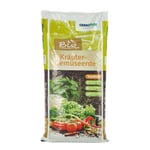Peat-free herb and vegetable soil

Peat-free herb and vegetable soil
- Organically fertilized special soil for growing herbs and vegetables
- Optimal nutrient supply with compost, coconut husks and spelt hulls
- Peat-free: Water retention capacity thanks to wood fibers
General Information
Resource soil without peat. Herb and vegetable soil
It's not just the raw materials used to make this organically fertilized special soil that are renewable. With green compost, coconut husks and spelt husks, the pre-grown vegetables and herbs (including those bought from the supermarket) are optimally nourished throughout the season. Wood fiber as a peat substitute improves water retention and water distribution, whether in beds, balcony boxes or pots. The packaging for the herb and vegetable soil is also made at least in part from a renewable raw material, as the film consists of 60% sugar cane as a substitute for the crude oil otherwise known to be used in plastic production.
Please note:
When using peat-free soils with organic fertilization, it is recommended to start top dressing early. Organic liquid fertilizer can be applied once a week just two to three weeks after planting if horn shavings have not been mixed in beforehand. Do not press the herb and vegetable soil down too firmly and ensure sufficient watering. This soil is not suitable as sowing soil or for young plants.
Nature conservation through peat extraction
Peat extraction and nature conservation rarely go hand in hand. We know that the opposite is usually the case. A layer of peat grows about one millimetre per year, and so the extraction of just one cubic metre - as is currently practised in the Baltic region - destroys the yield of about 1,000 years and thus destroys this unique habitat, which consists of highly specialized animal and plant communities. In Germany, on the other hand, the extraction of peat from intact moors has been banned since the 1980s by the Lower Saxony Moor Protection Program.
The upper and lower field process
The soil manufacturer Gramoflor in Vechta has developed its own extraction process that enables the successful renaturation of peat deposits - drained areas that have been depleted on the surface by agriculture - in parallel with the extraction of the raw material. Gramoflor currently cultivates around 450 hectares of such areas in the vicinity of its operating facilities. Extraction begins with the typical sod-cutting method. Only when the subsequent milled peat extraction begins does the extraction area divide into the upper field, where peat continues to be excavated in small parcels, and the lower field, which is carefully rewetted and inoculated with valuable Bulttorf mosses from the company's own breeding program. From the fifth and sixth year of extraction at the latest, renaturation and peat extraction run simultaneously. Cottongrass and rushes, characteristic bog plants, settle and the fauna native to the raised bog returns, and species-rich biotopes can now grow again where previously mainly maize was grown in monoculture. It takes around nine to twelve years for the renaturalized layer to become stable. Peat extraction will continue until the upper field has been completely removed.
Not an infinite resource
Only through peat extraction and simultaneous renaturation will the former raised bog areas be restored in the long term. Permanently owned by Gramoflor, they will continue to be maintained in accordance with nature conservation regulations - reuse by agriculture is contractually excluded anyway. Today, the soil manufacturer from Lower Saxony assumes that the company's own peat deposits will be exhausted within the next 20 years. However, substitutes that come close to the properties of peat in terms of water retention and distribution, structural stability and air retention and are perceived as equivalent by professional gardening companies are still rare. Gramoflor is therefore researching plant-based alternatives in trial gardens. Wood fiber, coconut husk, spelt husks or green waste compost are already components of some organic soils for the hobby garden. The soil manufacturer uses peat as sparingly as possible and predominantly from its own extraction.
Product Information
Article Number 70264
- Organically fertilized special soil for growing herbs and vegetables
- Optimal nutrient supply with compost, coconut husks and spelt hulls
- Peat-free: Water retention capacity thanks to wood fibers
All information on composition, storage and use on the packaging. 20 liters in a bio-film bag
Have a question?
If you have a question concerning this product you are welcome to contact us. For this your E-Mail program will open.
Customer Service
Whether its advice, spare parts, or special requests - all your questions and concerns are handled personally and thoroughly by our customer service.
You can contact us anytime at info@manufactum.dk

